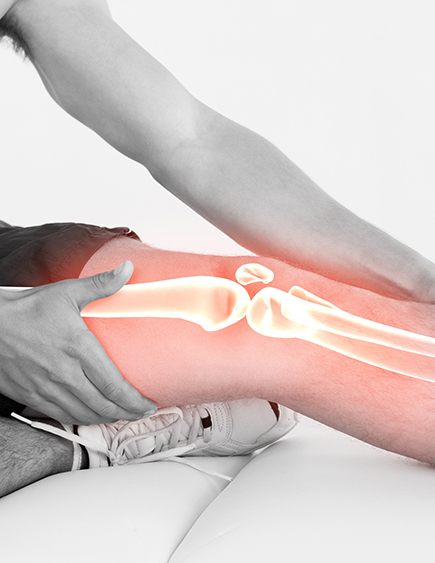The Best Knee Pain Treatments in 2019 According to Top Pain Doctors
Sep 18, 2019
When you’re a teenager, your physical abilities seem limitless. Your young body takes chances and tackles extreme motions because it can handle it! From cuts and spins on the football field to pivots on the basketball court, your range of motion and ability to recover after intense exertion is pretty remarkable. Sure, you might have needed a cold pack that one time, but a minor injury or joint pain didn’t keep you on the sidelines for long.
Fast forward a few years and your knees, hips, back, and feet have seen more than a few miles. Now, suffering a knee injury or experiencing joint pain has a few side effects. Sure, you’re taking glucosamine and chondroitin to promote healthy joints, but the knee pain you’re feeling makes even small tasks difficult. When is it time to seek medical attention? Top pain doctors utilize the best knee pain treatments in 2019 that are specifically designed to get you back on your feel quickly with minimal recovery time. At Pain Treatment Specialists, our team of board certified and Ivy League-educated doctors are knee pain specialists, who employ the best knee pain treatments in 2019 for your individual pain needs.

What are the Best Knee Pain Treatments in 2019?
Many people avoid looking for knee pain treatments because they fear that surgery is their only option for pain relief. However, the best knee pain treatments in 2019 don’t require surgery at all! The team at Pain Treatment Specialists know that the best course of pain relief is found through nerve blocks, ablations, injections, and physical therapy.
- Steroid Knee Injection: Also known as corticosteroids, this medication can be administered in a variety of ways to reduce knee inflammation and knee pain. This fast-acting injection provides immediate relief of irritated and inflamed joints, bursa, and tendons
- Genicular Nerve Block: This cutting-edge procedure (also known as “G Block”) blocks the sensory nerves that transmit pain to the brain. It can also be used as a diagnostic tool to identify the progression of arthritis.
- Genicular Nerve Radiofrequency Ablation: For patients who experience chronic knee pain after a knee replacement surgery, GNRFA is one of the newest and best knee pain treatments in 2019 tackling this pain issue. Your pain doctor uses three needles placed under x-ray guidance to precisely locate the affected nerve. Heat energy then passes through the needles directly into the problematic nerve, blocking pain signals sent from the knee joint.
- Hyaluronic Acid Injection/Viscosupplementation: Hyaluronic acid is a key component of joint fluid, which gives the fluid its viscous, slippery quality. If you’re experiencing knee osteoarthritis, your body may not have enough hyaluronic acid. Viscosupplementation is a treatment where hyaluronic acid is injected into the knee joints to supplement your body’s natural supply, adding cushion to protect knee joints during impact.
- Physical Therapy: The goal of physical therapy is to improve mobility, relieve pain, and target specific exercises that strengthen your knee. Also known as rehab, this treatment for knee pain can address both knee injuries as well as chronic knee pain. Your physical therapist will create a specialized pain treatment plan to address your specific chronic knee pain concerns.
The best knee pain treatments in 2019 do not need to involve painful surgery or addictive narcotics for chronic knee pain relief. Contact the team at Pain Treatment Specialists to see what cutting-edge treatments work for your specific knee pain concerns.

What are the Causes of My Knee Pain?
Knee pain falls into one of three categories: acute injury, chronic conditions, or medical conditions. The best knee pain treatments in 2019 offer knee pain relief for all three of these causes. Your pain doctor, such as the team at Pain Treatment Specialists, thoroughly understand all three of these categories, as well as the best knee pain treatments in 2019 for pain management. The three categories are:
- Acute Injury: When you hit, bump, or twist your knee and then experience pain, it is likely that you have experienced an acute knee injury. More specifically, an acute injury can affect fall under the following areas:
- Ligamentous Injury: This is a tear that affects the ligaments which stabilize the knee and can lead to pain and joint dysfunction. For example, an ACL (anterior cruciate ligament) tear is common among athletes because it is one of the ligaments connecting your shin bone to your thigh bone.
- Fracture: This injury is commonly experienced during the trauma of a car accident or fall. The bones of the knee, including the kneecap, can fracture or break.
- Torn Meniscus: This is the “shock absorber” between your thigh bone and shin bone. A torn meniscus occurs if you’ve made a sudden twist while also putting pressure on your leg.
- Chronic Conditions: A chronic condition is one that can occur from overuse or through repetitive motions of your knee. Some examples of chronic conditions include:
- Patellar Tendonitis: Also known as “jumper’s knee”, this pain is typically felt while running downhill or descending stairs. Stress on the patella tendon while running, jumping, or kicking causes this type of tendonitis.
- Bursitis: Bursa are tiny, fluid-filled sacs near your joints, and either through aging or repetitive motions the sacs become inflamed.
- Medical Conditions: A medical condition, which is diagnosed by a general physician, can lead to knee pain. Some common conditions that lead to knee pain include:
- Rheumatoid Arthritis: An autoimmune disease that causes swelling of the joints along with severe pain.
- Gout: This form of arthritis is extremely painful during flare-ups.
- Septic Arthritis: This type of infectious arthritis can affect the knee joint and cause swelling and localized pain.
Even if your knees aren’t as young as nimble as they once were, that’s no reason to live with chronic knee pain. Contact the team at Pain Treatment Specialists and discuss how pain doctors provide the best knee pain treatments in 2019.



















